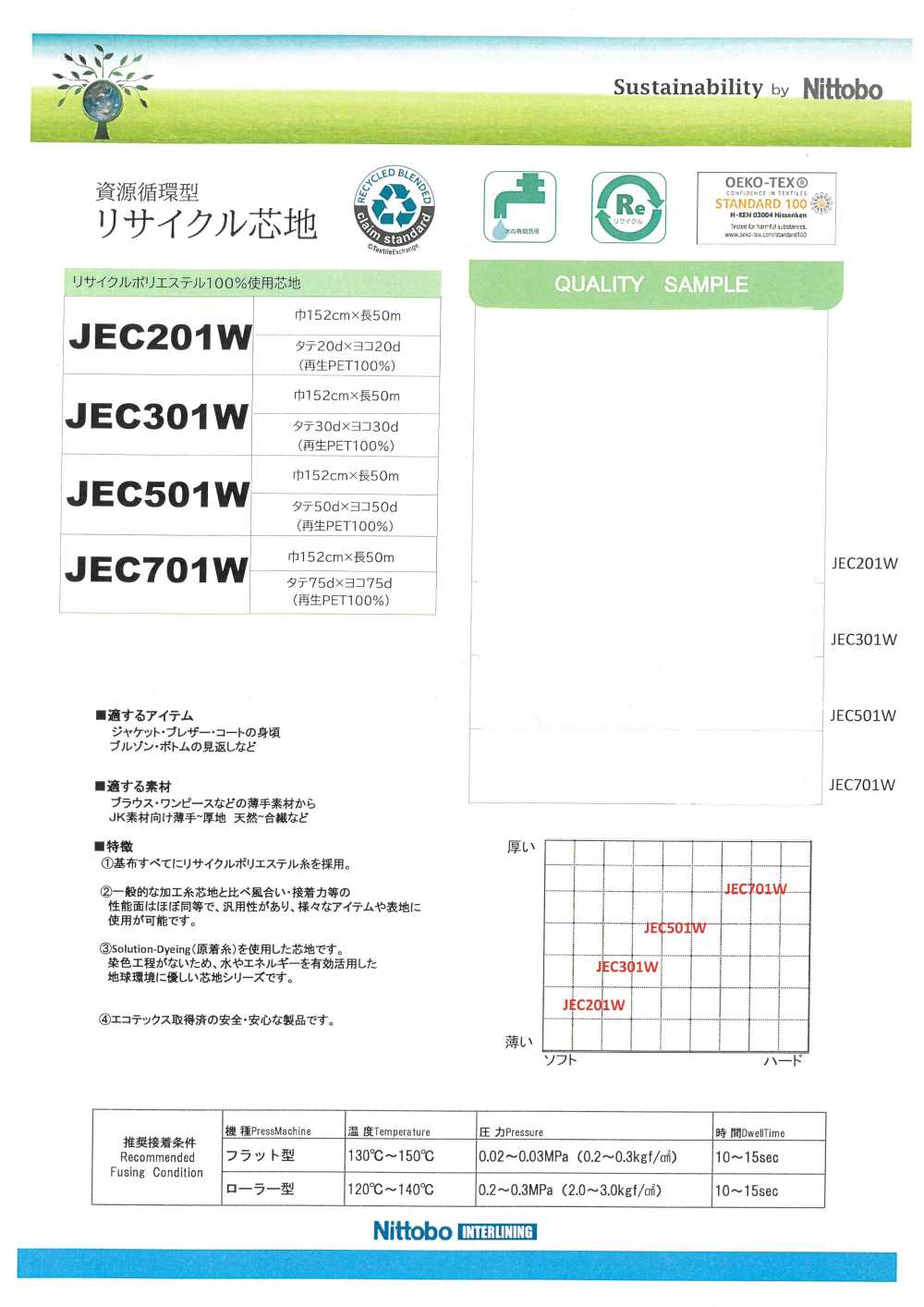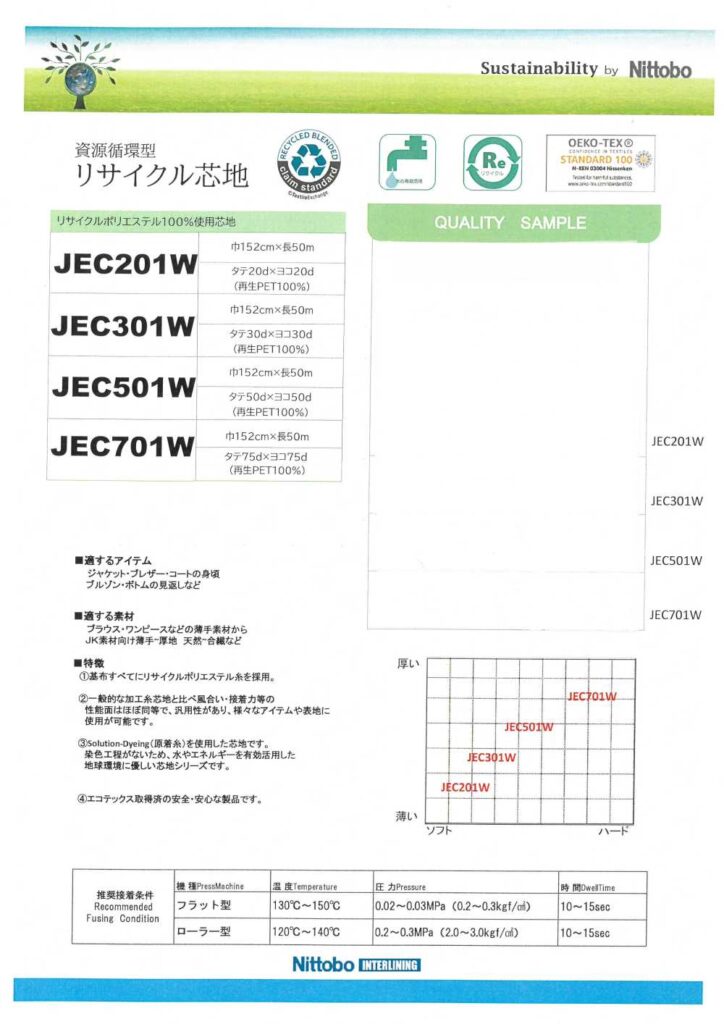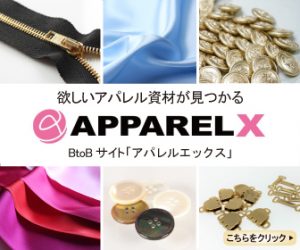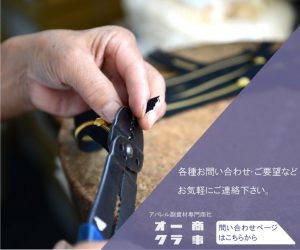Interlining in the Age of Sustainability! ~Introducing Recycled Interlining~

Hi Readers!
In this blog, we will introduce you to the recycled interlining by Nittobo, a leading interlining manufacturer in Japan.
Interlining is something that isn’t visible from the outside, but for those who truly aim to create sustainable garments, they believe that auxiliary materials like interlining should also be sustainable.
Especially in recent times, there are brands emerging that aim to reveal how much environmental impact they have during the process of creating a single garment.
So, if you’re in search of sustainable interlining, please keep reading!
Contents
Features of the JEC Series
There are 4 main points to the JEC series that we’re introducing today.
①All base fabrics utilize recycled polyester thread.
The base fabric use 100% recycled polyester thread.
As many of you may already know, recycled polyester refers to materials such as PET bottles and polyester-based clothing being collected and processed back into fibers for reuse.
②It offers performance comparable to conventional processed thread interlining.
In terms of characteristics like texture and adhesive strength, it is nearly equivalent to typical processed thread interlining, making it versatile and suitable for use with various items and outer fabrics.
③Threads are solution-dyed
Original core threads refer to threads that are manufactured with color additives such as pigments or dyes added to the raw material of the fibers, making them pre-colored. By using these original core threads, the need for a dyeing process is eliminated, which in turn reduces water and energy consumption as well as CO2 emissions, offering significant environmental benefits.
④OEKO-TEX certified
OEKO-TEX is a certification system that stands for the following:
This certification is the hallmark of the world’s highest level of safe textile products, granted only to products that have passed rigorous analytical tests targeting over 350 types of harmful chemicals. It adheres to international safety standards that comply with regulations in not only Japan but also various countries in Europe, the Americas, and Asia, making it a globally recognized safety standard.
Source
It has passed stringent inspections, ensuring a safe and reliable product.
The Interlinings
Let us introduce the interlinings.

・JEC201W Thin Versatile Soft Interlining 20D Recycled Materials Used
This is the product with the lowest denier (thread thickness) count in the JEC series.
It’s the recycled polyester version of Nittobo’s ON2000, a product from the same company.
It comes in a wide 152cm design, offering excellent cost performance. (All products in the JEC series are 152cm wide)
Suitable for: blouses, shirts, bottoms, and knits.
Furthermore, it’s a versatile interlining that can be used with various materials and items beyond the ones mentioned above.
・JEC301W Thin Versatile Soft Interlining 30D Recycled Materials Used
This one is a little more heavy weight than the JEC201W at 30D.
This is the recycled polyester version of ON3000.
Suitable for: jacket, blazer, coat body, blouson(jackets with cinched bottom hems, like bomber or varsity), and bottoms
・JEC501W Thin Versatile Soft Interlining 50D Recycled Materials Used
This one is 50D.
This is the recycled polyester version of OMU5000.
Suitable for: jacket, blouson, coat, and various heavy-weight garment materials, including bottoms.
・JEC701W 薄手汎用性ソフト芯地 75D
This is the thickest in the JEC series at 75D, offering a rugged texture, making it the hardest in the series.
It’s suitable for various heavy-weight garment materials, including jackets, blousons, coats, and bottoms.
Suitable for: jacket, blouson, coat, and various heavy-weight garment materials, including bottoms.
Conclusion
In this blog, we introduced Nittobo’s recycled polyester interlining.
While there may not be many brands using sustainable materials for interlining yet, I believe that as “being sustainable” becomes more commonplace in the apparel industry, the importance of having sustainable auxiliary materials will continue to rise.
We highly recommend trying out these products now, as they are a top choice for those who want to make a difference.
We hope this article was informative and interesting; let us know what you think in the comments!
There are many more products that we can’t cover in this blog, so please take a look at our site ApparelX!
If you are considering ordering in large lots or would like to have a corporate representative contact you, please visit the Okura Trading Contact page!



